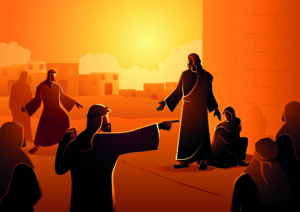By William Perkins
Editor

Among the original American holidays on our calendar, Thanksgiving for many of us harbors the warmest thoughts and deepest sentimentalities. The World Book Encyclopedia puts it this way:
Thanksgiving is usually a family day, celebrated with big dinners and joyous reunions. The very mention of Thanksgiving often calls up memories of kitchens and pantries crowded with good things to eat. Thanksgiving is also a time for serious religious thinking, church services, and prayer.
Indeed it is, but in our present-day, politically-correct/woke culture, we are discouraged from understanding the true meaning of the holiday. We – and particularly our children – are induced to believe Thanksgiving is little more than a secular day off work, devoid of spiritual meaning and actually representing a dark period in the country’s long record of oppression.
No description of Thanksgiving could be farther from the truth, as evidenced by a brief review of unrevised history from various authoritative sources.
The first Thanksgiving was observed less than a year after the Plymouth colonists came ashore in Massachusetts in 1620. The harsh first winter in the new world wiped out nearly half the colonists, but 1621’s bumper harvest put an end to the famine and its associated problems.
There was such rejoicing in the colony that the people began to set aside a time to give thanks for their abundance, which they readily acknowledged was a gift from Almighty God.
The observances across the colony grew so rapidly that in 1623, Massachusetts Governor William Bradford declared a formal, three-day thanksgiving feast to be held beginning on July 30 of each year. The observance became a tradition that took root as other colonies were established, and even survived the Revolutionary War.
After the Revolutionary War, President George Washington issued a proclamation that codified a special day of thanks in the fledgling country. Most of the governments of the time adopted Washington’s lead and observed their own days of thanksgiving at various times of the year.
In 1863, President Abraham Lincoln declared a national holiday on the fourth Thursday of November and the states soon aligned their observances.
President Franklin Roosevelt set the holiday one week earlier in 1939, to lengthen the Christmas shopping season during the Great Depression. The U.S. Congress was not pleased, voting in 1941 to return Thanksgiving to the traditional fourth Thursday in November and declaring a legal holiday on that date.
For thousands of years, people around the world have held harvest festivals and thanked God for His bountiful gifts, but this uniquely American holiday of Thanksgiving should hold special meaning for us, the beneficiaries of God’s blessings beyond all forms of measure.
Our modern agricultural system feeds us, with plenty left over to feed the rest of the world. In addition to our full bellies, more than at any other time in history our generation is shielded from the elements and guarded from disease.
We make a grave mistake, however, when we take all that for granted and believe we are actually responsible for our own good fortune (Deut. 8:6-19), as do so many of our fellow Americans apparently assume today.
This Thanksgiving Day, be sure to focus your gratitude where it belongs, toward the One who provided the food you will have before you, the home in which you will eat it, the family with whom you will enjoy it, and the means to do all that and much, much, more.
Come to think of it, that should be our thanksgiving prayer 365 days a year.








